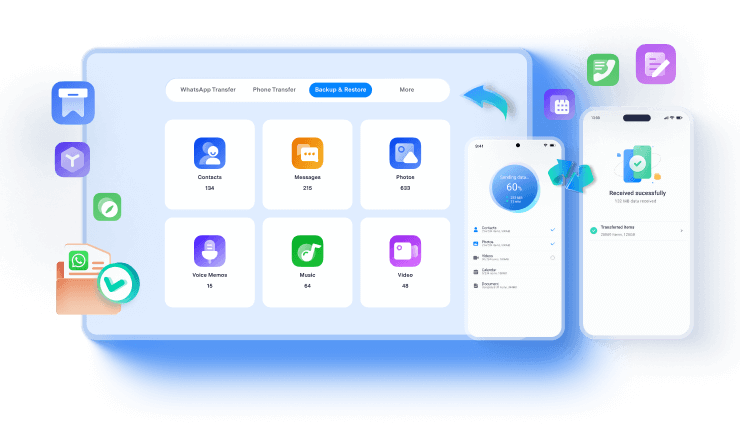Text messages can serve as crucial legal evidence in civil disputes, custody battles, employee complaints, or even defamation cases. Courts rely on written communication for clarity, and SMS or iMessages are increasingly used in digital evidence.
But how do you make sure these texts are printed properly, clearly showing timestamps, contact names, and conversation threads? Using both free and paid options, such as MobileTrans, which lets you export messages in PDF, TXT, or HTML forms for legal submission, you'll learn how to print text messages from Samsung, Android, and iPhone devices.
In this article
Part 1: Can You Legally Print Text Messages for Court?
Yes, text messages are legally admissible in most courts if they meet specific requirements.
When Are Text Messages Considered Legal Evidence?
- The messages must display identifiable sender and receiver names or phone numbers.
- Timestamps and message order must be intact to prove context.
- The conversation should be presented without edits or omissions that could misrepresent intent.
Messages often become pivotal in cases involving:
- Divorce and child custody
- Harassment claims
- Business agreement disputes
- Contract breaches
- Fraud or coercion
Screenshots vs. Exported Messages
While screenshots are fast and easy, they can be challenged for accuracy or manipulated using image editing tools. On the other hand, PDFs or TXT exports using certified tools, such as MobileTrans, ensure the chain of evidence remains intact. These exports maintain message integrity with full threads, timestamps, and sender metadata—ideal for court.
Part 2: Using an iPhone to Print Court-Free Text Messages
If you don't want to install extra software, Apple's ecosystem still provides basic options.
Option 1: Take Screenshots
Steps to follow:
Step 1: Open the Messages app.
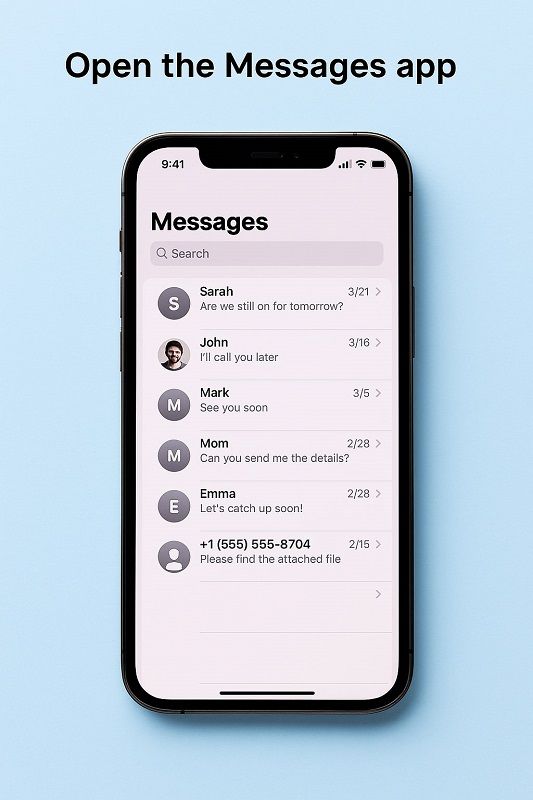
Step 2: Tap the desired conversation.
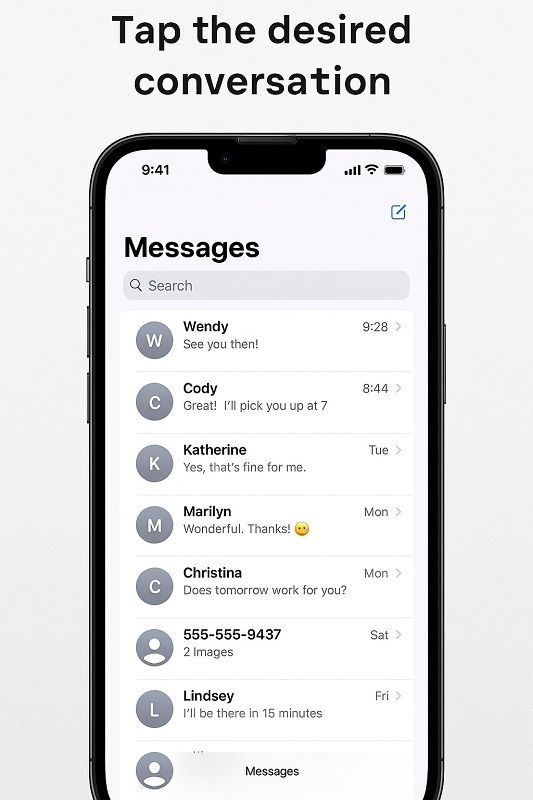
Step 3: To snap screenshots, use the Power + Volume Up buttons.
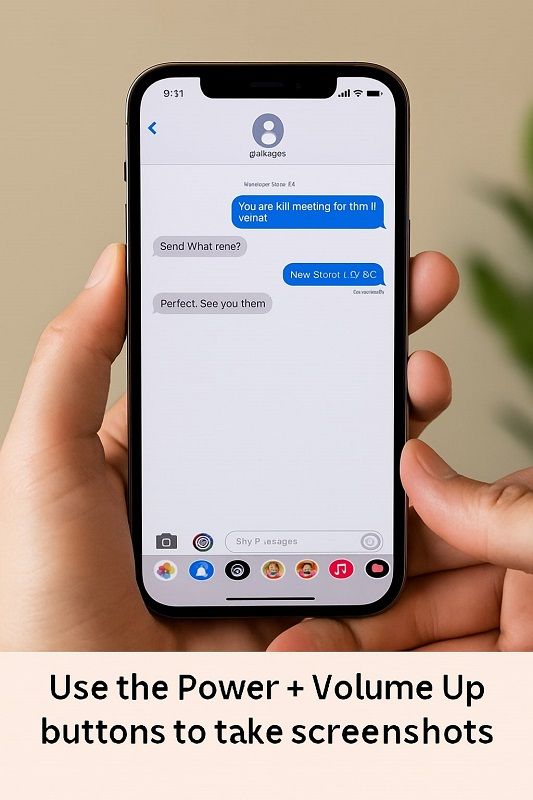
Step 4: Send them via AirDrop or Email to your computer.
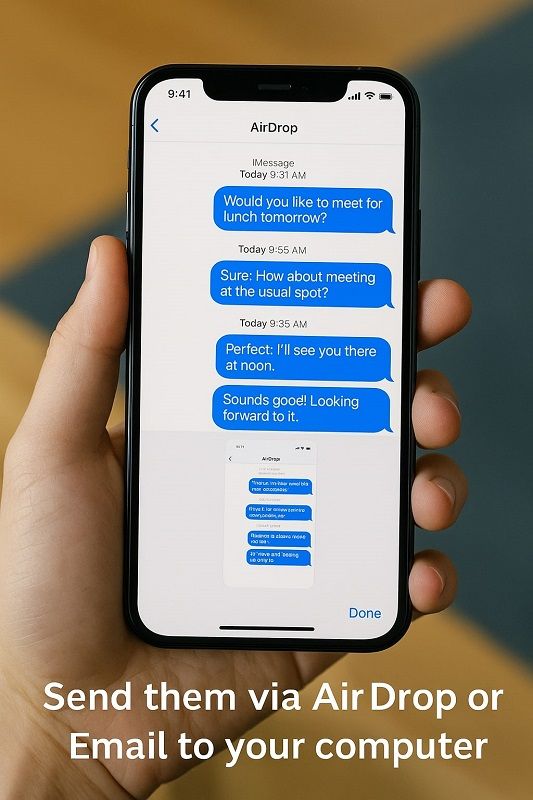
Step 5: Print the screenshots after opening on a Mac or PC.
Option 2: Copy-Paste into Notes or Word
Steps to follow:
Step 1: Long-press a message and tap More.
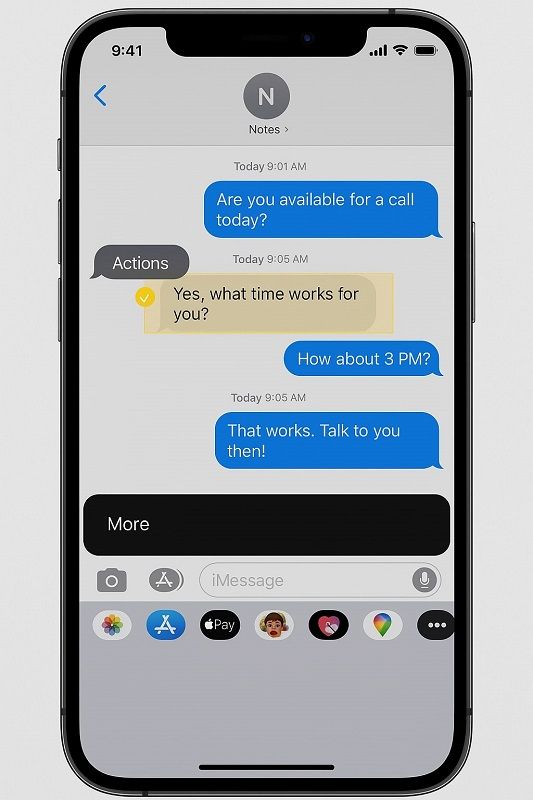
Step 2: Select all relevant texts and tap Copy.
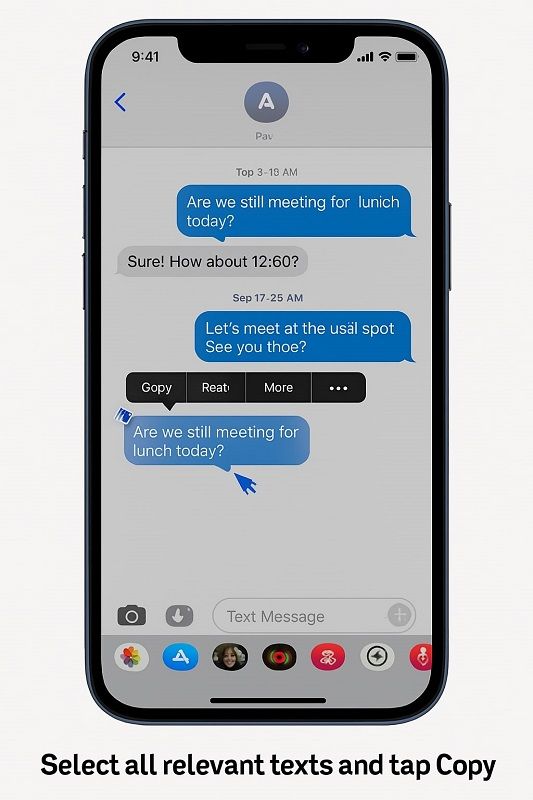
Step 3: Open the Notes or Pages/Word app.
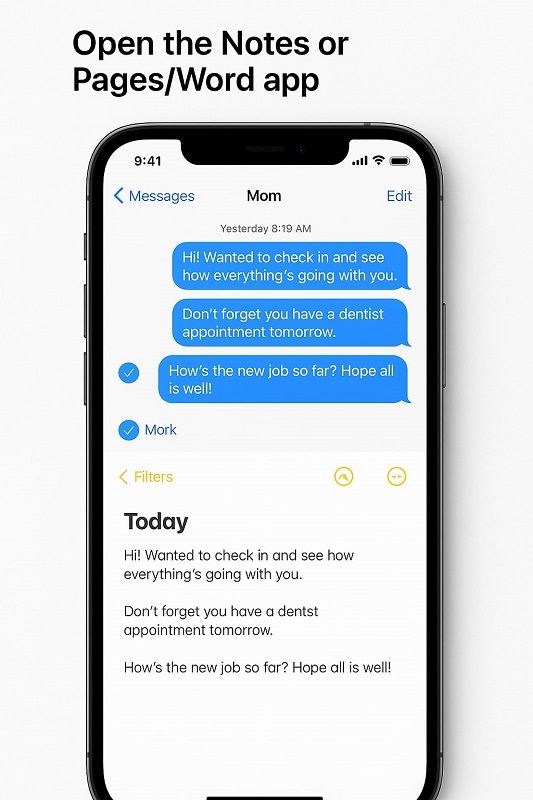
Step 4: Paste the messages and format them for clarity.
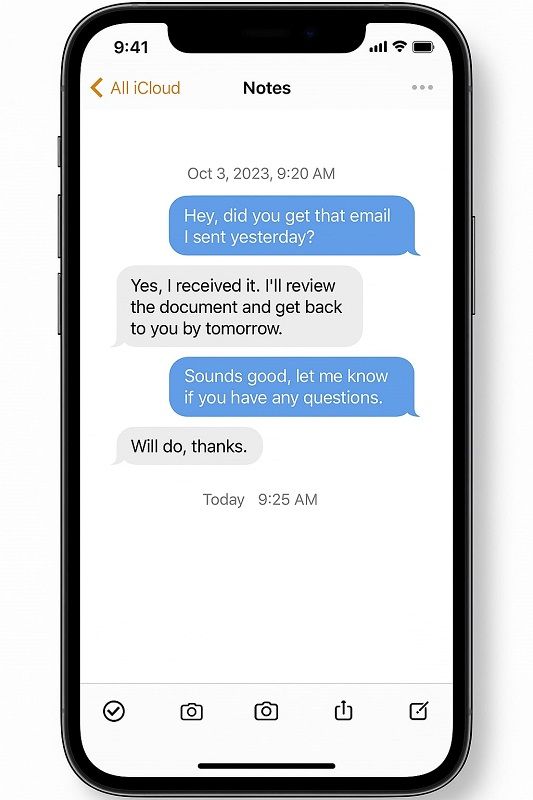
Step 5: From your PC or cloud storage, save and print.
When Are Free Methods Useful?
Free methods work well when you only need to print a short conversation or need a quick record. However, for court cases where full threads, attachments, or multiple conversations are required, professional tools are safer and more reliable.
Part 3: How to Print iMessages for Court (Detailed Method)
Apple's iMessages are encrypted, which is great for privacy, but it can make exporting messages a challenge.
Important Tips for iMessages:
- Scroll back and capture the entire conversation to avoid missing context.
- Always include names, dates, and timestamps in each screenshot or printout.
- If exporting long message threads, it's much easier to use a tool like MobileTrans for clean formatting and legally accepted layouts.
Some courts may request logs that show message continuity—something screenshots often fail to deliver, especially in disputes over deleted or fragmented threads.
Part 4: How to Print Text Messages for Court Free from an Android Device
Samsung and Android phones have flexible options for capturing messages.
Option 1: Screenshot and Email
Steps to follow:
- Open the default Messages app.
- Scroll through and take screenshots of the required texts.
- Email it to yourself via Gmail.
- Download and print from your PC or a print shop.
Option 2: Use Google Takeout (Advanced)
If you're tech-savvy and want complete access:
Step 1: Visit Google Takeout (takeout.google.com).
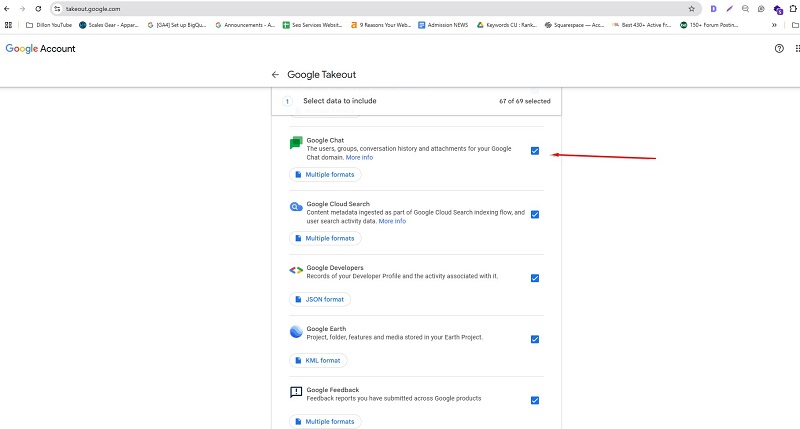
Step 2: Select Messages under data types.
Step 3: Export and download the archive to your PC.
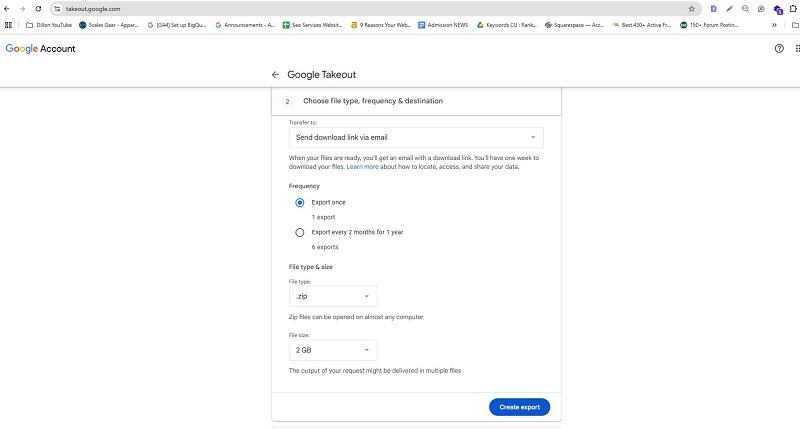
Step 4: Open the file with a text editor to read and print it.
Note: Google Takeout may export messages in raw data formats, which are not immediately user-friendly. You'll need to clean up the output or convert it manually for court presentation.
Part 5: Best Way to Print Messages for Court – Use MobileTrans
When it comes to legal-ready documents, MobileTrans is a game-changer.
MobileTrans is a software by Wondershare that allows you to export messages from both iPhone and Android into PDF, TXT, or HTML formats. It is particularly suitable for legal use because it:
- Retains sender names, timestamps, and attachments
- Offers easy search and filtering
- Allows full-thread exports without missing any messages
How to Use MobileTrans:
Step 1: Get MobileTrans and install it on your Windows or Mac. Start MobileTrans by first connecting your phone to a computer. Navigate to Phone Transfer > Phone to PC.
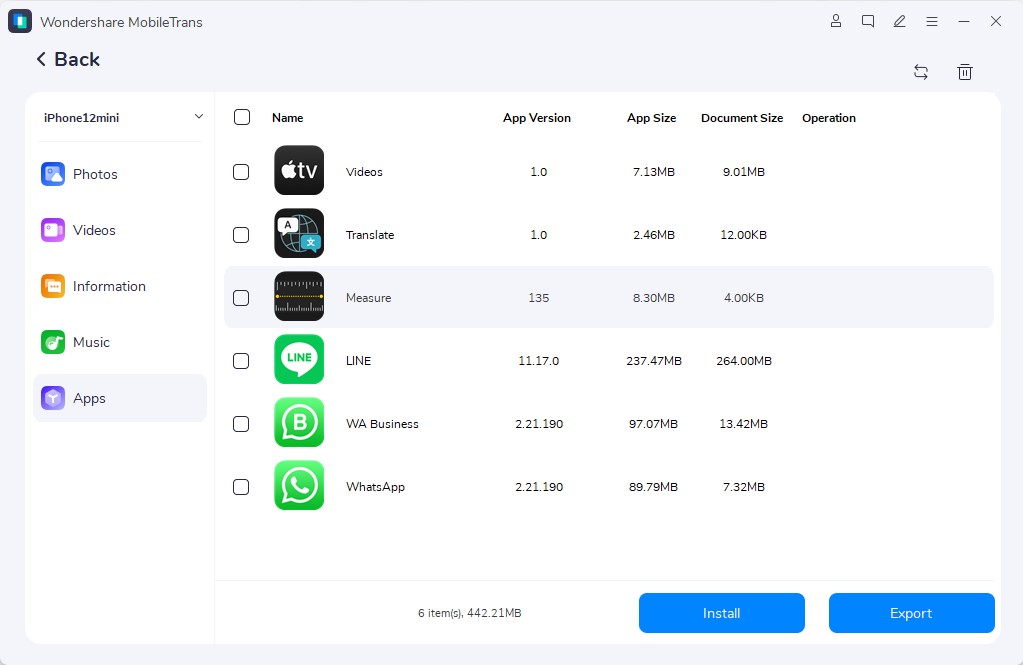
Step 2: Choose Messages from the data types. You may view the messages and choose which chat to export.
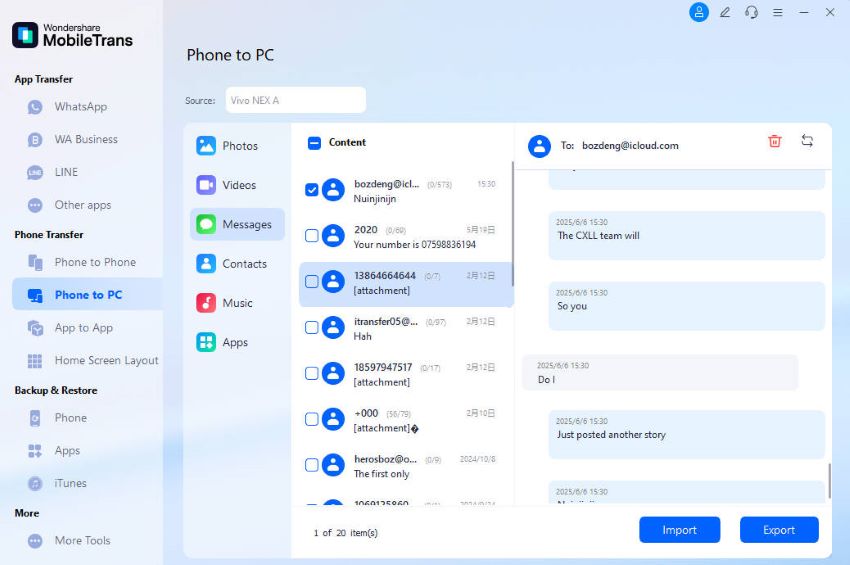
Step 3: You have the option to save the exported messages in text, CSV, or HTML formats after clicking the Export button.
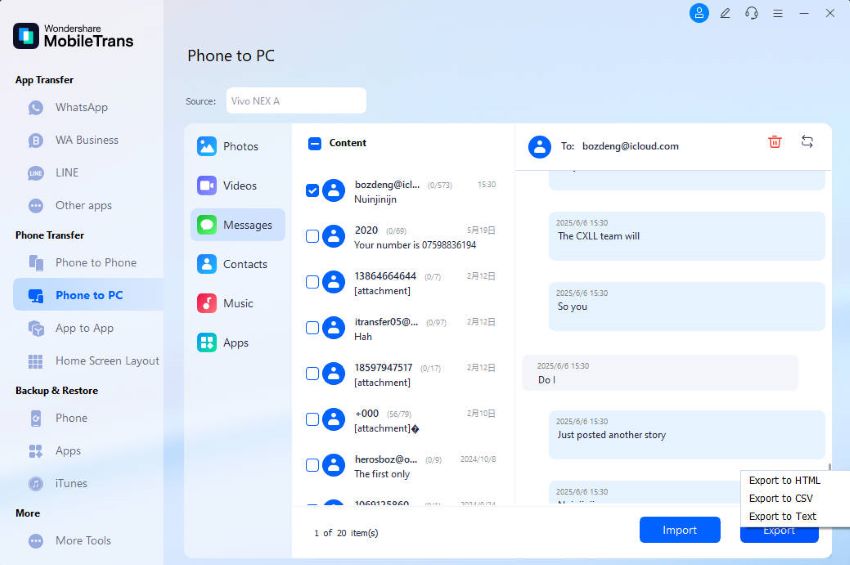
Step 4: Click the Export button. The export will finish shortly if you keep your phone connected. You will receive a message as soon as the process is complete.
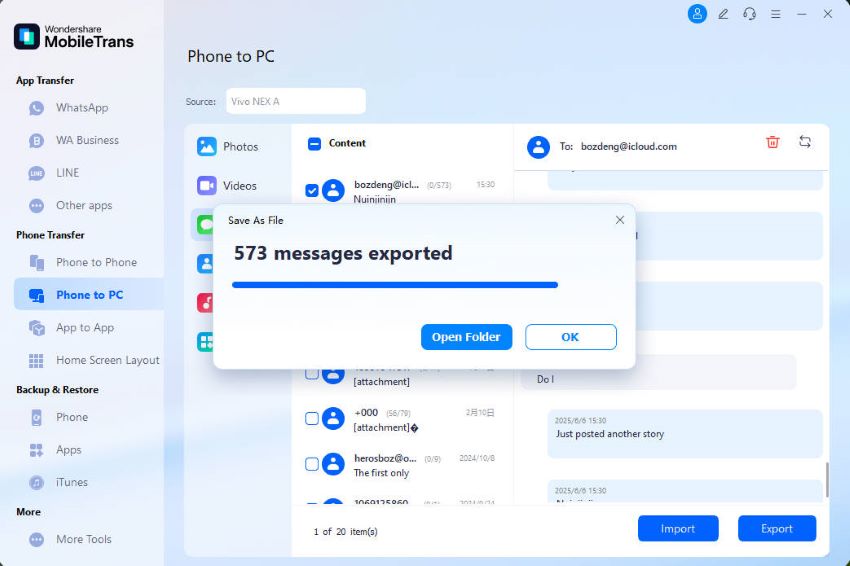
Step 5: Once you've downloaded the PDF file, simply open it on your computer and click Print to get a hard copy for court use.
Why Choose PDF?
- Uneditable: Ensures integrity in court.
- Clean layout: Easy for legal teams and judges to read.
- Universal format: Accepted in legal and professional settings globally.
Part 6: Tips to Make Sure Your Printed Messages Are Court-Ready
Before submitting your text messages as evidence, it's crucial to ensure they meet legal standards. Courts require clarity, authenticity, and proper formatting. The tips below will help you prepare professional, court-admissible message printouts that support your case effectively. To avoid your evidence being dismissed, follow these key practices:
- Always include timestamps and sender/receiver info
- Capture the full conversation thread for context.
- Do not crop screenshots—it weakens credibility.
- Use tools like MobileTrans to export long or multi-person threads.
- Keep both digital and printed backups.
- Ensure the attached media (photos, videos) are also included if relevant to the case.
Pro Tip: If you're submitting evidence digitally, always use a read-only format like PDF and label your files clearly with names and dates.
Conclusion
Whether you're going through a legal dispute or just want a safe backup of your messages, it's essential to print them in a clear, verifiable, and organized manner. Free methods like screenshots and copy-paste work for small needs, but for serious legal use, MobileTrans provides the best all-in-one solution. It keeps your evidence court-ready, secure, and easy to present.
FAQ
-
Q: Is it possible to print text messages straight from my phone?
A: Yes, you can take screenshots or use copy-paste to print messages directly. For long threads or legal cases, however, using your phone like MobileTrans is far more efficient and accurate.
-
Q: What is the best format to print messages for the court?
A: PDF is the most preferred format due to its fixed layout, print-friendliness, and inability to be altered easily.
-
Q: Is MobileTrans free to use?
A: MobileTrans offers a free trial. Full export features for message printing are included in the paid version.
-
Q: Will screenshots hold up in court?
A: Screenshots can be questioned, but they could be acceptable. For full conversation integrity, tools like MobileTrans are a better option.
-
Q: Can I include media attachments when printing messages?
A: Yes, tools like MobileTrans can export messages along with images or videos if they are part of the conversation thread.
-
Q: What if I deleted some messages? Can I still retrieve and print them?
A: You may be able to recover deleted texts using third-party recovery tools before exporting them, but success is not guaranteed if they're overwritten.







